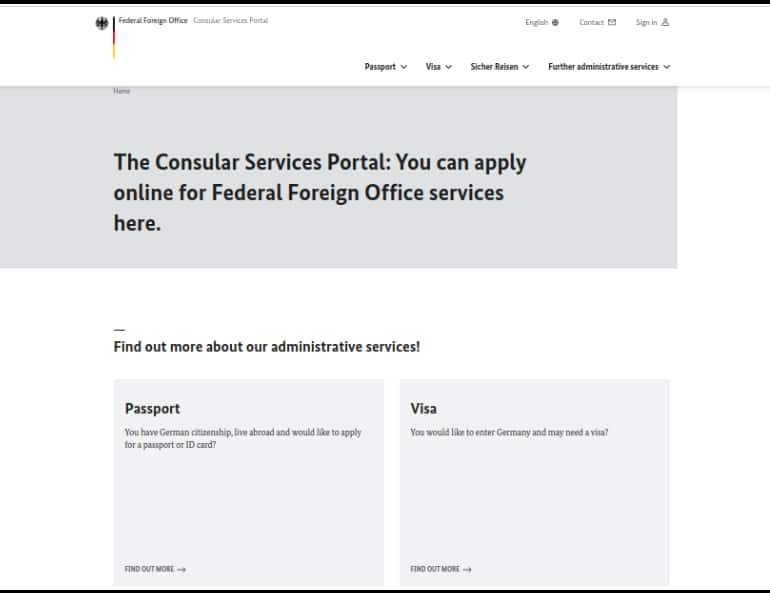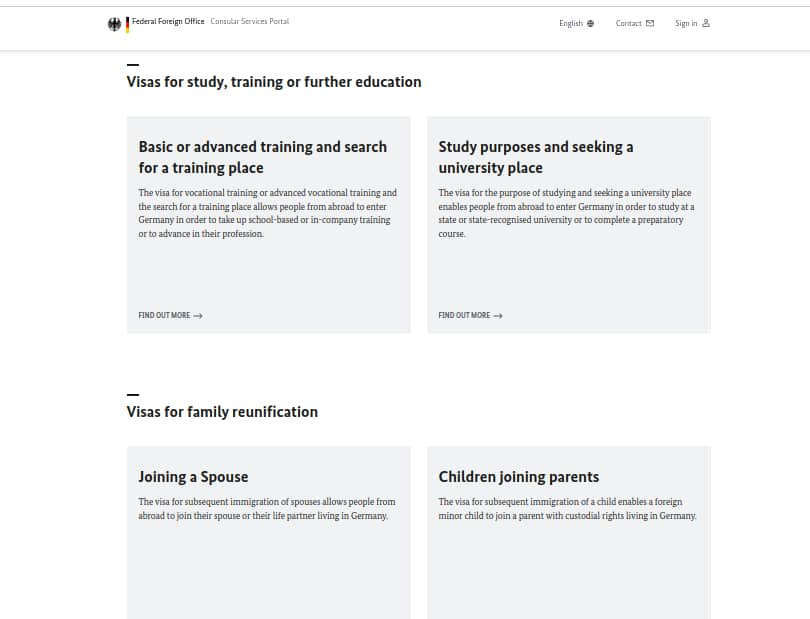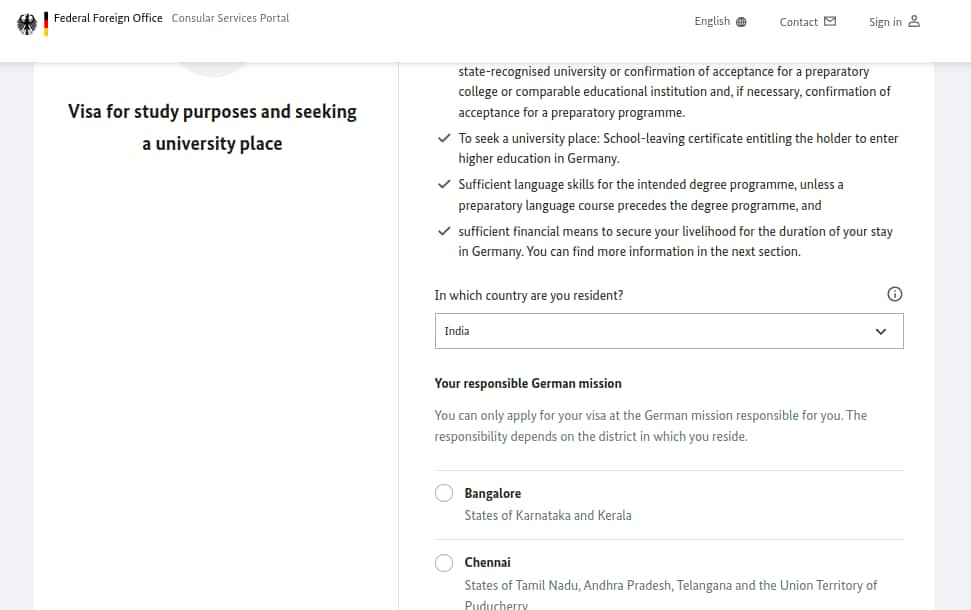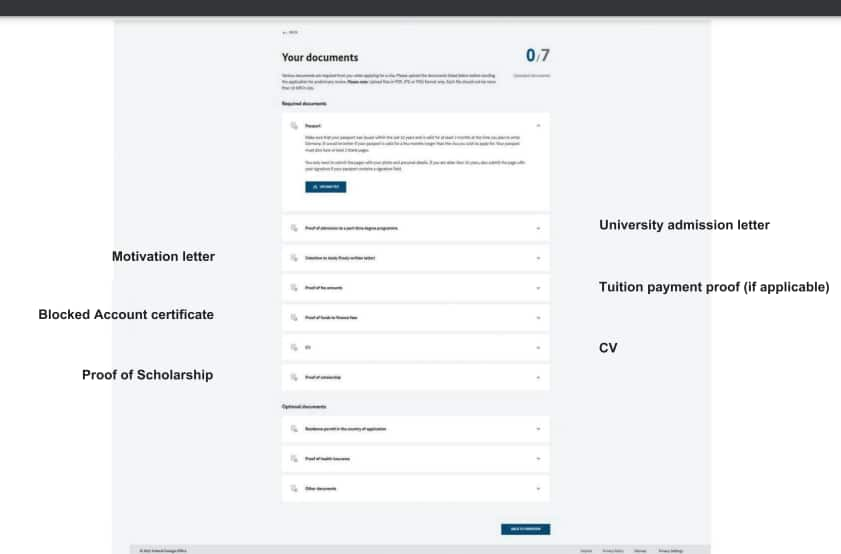New German Student Visa Process: Online Portal at digital.diplo.de for Applications
The German student visa process for 2025 has become increasingly digital, requiring students to apply online on the portal of Consular Services, upload all the required documents, and booking a slot for biometrics at a German mission or VFS centre. The new German visa process was introduced effective from 17th February 2025. The new online student visa application portal was introduced to simplify the German student visa process. This change addresses the significant delays that international applicants have faced, with German student visa processing times previously taking up to six months last year. With the new portal, foreign students applying for German student visas can get it approved within the timeframe and avoid the hassle of physical paperwork and the existing waitlist system. We have mentioned the complete step-by-step guide on the changes to Germany’s student visa processing in this article. Read further to understand how to apply for Germany student visa through a new online portal.
This Story also Contains
- What is New Germany Student Visa Process?
- How Germany Online Visa Portal Works For Student Visa Processing?
- Germany Student Visa 2025 Process: Key Highlights
- How to Apply for a Germany Student Visa 2025
- Steps to Follow After Successfully Applying At Germany Online Visa Portal

Related Reads:
- Do you need a Resident Permit for Germany if you already have a Student Visa?
- Germany Student Visa Guidelines
- German Universities With Easy Admission Requirements
The German student visa process for 2025 is increasingly digital, requiring you to apply online via the Consular Services Portal, upload documents, and schedule an in-person appointment for biometric data collection at a German mission or VFS center. Key documents include a university acceptance letter, an APS certificate (for Indian applicants), proof of financial means (like a blocked account), health insurance, academic transcripts, a CV, a statement of purpose, and a valid passport.
What is New Germany Student Visa Process?
German immigration has offered a new Consular Services Portal for simplified student visa application processing for international students. This new website offers a completely digital application process that is not only limited to German student visas but also covers 28 other national visa categories as well, such as work permits. Students who are currently studying in Germany can also access this online portal at digital.diplo.de for post study work permit applications in Germany.
Germany launches online visa portal for students to attract skilled professionals and students across countries ensuring more efficiency and discontinuing the German waitlist system. The main aim is to offer faster application processing, reducing unnecessary delays and physical documentation.
How Germany Online Visa Portal Works For Student Visa Processing?
Germany launches online visa portal for international students, including Indians. This online portal allows Indian applicants to fill out applications and submit documents digitally at digital.diplo.de. It removes the need for physical paperwork and the existing waitlist system. Once the application and documents for German student visa are submitted, the concerned authorities review the application, and approved candidates receive a notification from the VFS centre to schedule a biometric data collection and document verification appointment. On right confirmation about the credibility of the application and documents, you will then get the German student visa successfully.
Germany Student Visa 2025 Process: Key Highlights
The previous German student visa process has been revamped, effective from 17th February 2025. Here are the main highlights of the changes introduced as a part of new study visa application processing,
Online: The entire German study visa process is now online which was previously offline.
Digital Visa Document Submission: Students can easily apply and submit documents online at Consular Services Portal (CSP).
No Physical Paperwork: There are no physical paperwork requirements for German study visa applications.
Speedy Processing: New Germany student visa process 2025 India aims for faster visa application processing.
Waitlist System Discontinued: The existing waitlist system for visa appointments is discontinued with new Germany student visa process from India.
Read More:
How to Apply for a Germany Student Visa 2025
To apply for a German student visa in 2025 online, students can follow the below mentioned steps and navigate through the application process.
New Germany Student Visa Process 2025 India
STEP 1: Visit digital.diplo.de (Consular Services Portal). Click on ‘Visa’.

STEP 2: On the redirected page, choose ‘Study Purposes and Seeking a University Place’.

STEP 3: Select the country ‘India’ (Country of application). Then, click on 'Apply Online Now'. You will be directed to the online portal page.

STEP 4: Register on the Consular Services Portal with a valid email. Then fill out the application form with the required information. This part of the German student visa application generally includes personal and educational information of the applicant.
STEP 5: Upload necessary documents such as passport, university acceptance letter, financial documents, academic transcripts, etc.

STEP 6: Submit an application to apply for the German student visa
Steps to Follow After Successfully Applying At Germany Online Visa Portal
After successfully submitting the application digitally at digital.diplo.de, international students will receive a notification to book an appointment at a nearby VFS centre for document verification and biometrics.
Students should visit the designated German mission to attend the interview, provide their biometric information and get documents verified. Then, students can access their accounts on the Consular Services Portal to track their Germany student visa process status and updates.
Also Check:
Frequently Asked Questions (FAQs)
As per the new German student visa processing online through the Consular Services Portal, it can take up to 1 to 2 months to verify the documents and process visa applications for international students.
To fill out German visa application online, students need to create an account on the Consular Services Portal, fill the application with accurate information there, and submit relevant documents.
Upon approval of the student visa, applicants are notified on their registered email. They can then book an interview with the nearest VFS centre for biometrics and document verification.
The success rate of a German student visa 2025 for international students is approximately 92% to 95%. This shows high approval chances for the study visa in Germany.
The old way of German student visa application is completely revamped and new online application system is introduced for international students applying for a student visa in Germany. New rules for international students is to apply through the Consular Services Portal digitally.
Questions related to
On Question asked by student community
Hello,
Yes, you can get the Btech Program in germany but you need to complete one year foundation course and you have to pass FSP EXam. you can get more details about that by following the link attached.
LINK: https://studyabroad.careers360.com/download/ebooks/germany-complete-guide
I hope it helps!
Hello there, that's very interesting to know that you are intersted in doing medicine so I am here to help you out To do medicine in Germany as a Indian student you have two paths
1) Studying medicine direct there after your 12th or
2) Completing MBBS first in India
Hello aspirant,
Indeed, even if you have health insurance from India, you may still need to get German health insurance because everyone in Germany is required to have it, and Indian insurance isn't often accepted as enough by German requirements. You will require a German policy for your visa, university
Hello ,
Yes , It's possible to study B arch in Germany for free since most public universities don't charge tution fees but you need to meet certain requirements. A strong portfolio and you will have to show proficiency in the German language by passing exam like TestDaH or DSH.
Hello,
Yes, you can definitely pursue B.Sc. and an M.Sc. in Physics from IISc Bengaluru and then later aim for your Ph.D. (Doctorate) at Technical University of Berlin (TUB), Germany.
Choosing, the Physics programme from IISC has a strong international reputation, and its degree is well-recognized globally, including in German
Applications for Admissions are open.
Want to study in Ireland? Explore Universities & Courses
Study in Canada
ApplyExplore Universities, Courses & Subjects | Work while study
Study in UK
ApplyApply for upcoming intake & plan your journey
Study in USA
ApplyUniversities inviting applications | Get expert guidance
Study in Australia
ApplyShortlist best ranked universities & get expert guidance